Heavier object - Study guides, Class notes & Summaries
Looking for the best study guides, study notes and summaries about Heavier object? On this page you'll find 565 study documents about Heavier object.
Page 2 out of 565 results
Sort by
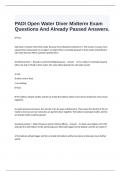
-
PADI Open Water Diver Midterm Exam Questions And Already Passed Answers.
- Exam (elaborations) • 27 pages • 2024
-
Available in package deal
-
- $10.19
- + learn more
D float. Salt water is heavier than fresh water because it has dissolved minerals in it. This means it causes more upward force (buoyancy) on an object. An object that is neutrally buoyant in fresh water would float in salt water because there is greater upward force. See Being a Diver I - Buoyancy and Controlling Buoyancy. - Answer 1) If an object is neutrally buoyant (does not sink or float) in fresh water, the same object placed into salt water would A sink. B either sink or flo...
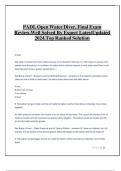
-
PADI, Open Water Diver, Final Exam Review.Well Solved By Expert LatestUpdated 2024.Top Ranked Solution
- Exam (elaborations) • 26 pages • 2024
-
- $9.49
- + learn more
D float. Salt water is heavier than fresh water because it has dissolved minerals in it. This means it causes more upward force (buoyancy) on an object. An object that is neutrally buoyant in fresh water would float in salt water because there is greater upward force. ,,, See Being a Diver I - Buoyancy and Controlling Buoyancy. - answers>1) If an object is neutrally buoyant (does not sink or float) in fresh water, the same object placed into salt water would A sink. B either sink or fl...
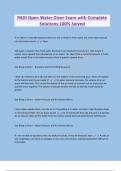
-
PADI Open Water Diver Exam with Complete Solutions 100% Solved
- Exam (elaborations) • 13 pages • 2024
- Available in package deal
-
- $13.99
- + learn more
PADI Open Water Diver Exam with Complete Solutions 100% Solved If an object is neutrally buoyant (does not sink or float) in fresh water, the same object placed into salt water would Float Salt water is heavier than fresh water because it has dissolved minerals in it. This means it causes more upward force (buoyancy) on an object. An object that is neutrally buoyant in fresh water would float in salt water because there is greater upward force. See Being a Diver I - Buoyancy and Contr...
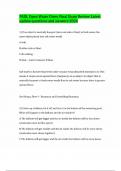
-
PADI, Open Water Diver, Final Exam Review Latest update questions and answers 2024
- Exam (elaborations) • 37 pages • 2024
-
- $9.99
- + learn more
PADI, Open Water Diver, Final Exam Review Latest update questions and answers 2024 1) If an object is neutrally buoyant (does not sink or float) in fresh water, the same object placed into salt water would A sink. B either sink or float. C do nothing. D float. - Correct Answer D float. Salt water is heavier than fresh water because it has dissolved minerals in it. This means it causes more upward force (buoyancy) on an object. An object that is neutrally buoyant in fresh water would fl...
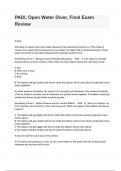
-
PADI, Open Water Diver, Final Exam Review Questions And Answers
- Exam (elaborations) • 20 pages • 2024
- Available in package deal
-
- $13.99
- + learn more
PADI, Open Water Diver, Final Exam Review Questions And Answers D float. Salt water is heavier than fresh water because it has dissolved minerals in it. This means it causes more upward force (buoyancy) on an object. An object that is neutrally buoyant in fresh water would float in salt water because there is greater upward force. See Being a Diver I - Buoyancy and Controlling Buoyancy. - ANS 1) If an object is neutrally buoyant (does not sink or float) in fresh water, the same obj...
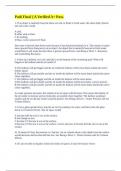
-
Padi Final || A Verified A+ Pass.
- Exam (elaborations) • 16 pages • 2024
-
- $12.49
- + learn more
1: If an object is neutrally buoyant (does not sink or float) in fresh water, the same object placed into salt water would A sink. B either sink or float. C do nothing. D float. correct answers D float. Salt water is heavier than fresh water because it has dissolved minerals in it. This means it causes more upward force (buoyancy) on an object. An object that is neutrally buoyant in fresh water would float in salt water because there is greater upward force. See Being a Diver I - Buoyan...
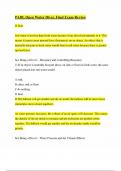
-
PADI, Open Water Diver, Final Exam Review
- Exam (elaborations) • 32 pages • 2024
-
Available in package deal
-
- $17.99
- + learn more
PADI, Open Water Diver, Final Exam Review D float. Salt water is heavier than fresh water because it has dissolved minerals in it. This means it causes more upward force (buoyancy) on an object. An object that is neutrally buoyant in fresh water would float in salt water because there is greater upward force. See Being a Diver I - Buoyancy and Controlling Buoyancy. 1) If an object is neutrally buoyant (does not sink or float) in fresh water, the same object placed into salt water would ...

-
PRAXIS SCIENCE 5905 STUDY GUIDE 2024-2025 QUESTIONS WITH VERIFIED SOLUTIONS
- Exam (elaborations) • 47 pages • 2024
-
- $13.49
- + learn more
_____________________ is the study of the history of life on Earth. - CORRECT ANSWER Paleontology Earth is believed to be _________________________________. - CORRECT ANSWER 4.5 billion years old protects Earth from harmful solar wind particles; responsible for the Northern Lights (Aurora Borealis); lies deep within the Earth - CORRECT ANSWER Earth's Magnetic Field charged particles escape from the sun's gravitational pull - CORRECT ANSWER Solar Wind ...
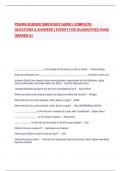
-
PRAXIS SCIENCE 5905 STUDY GUIDE | COMPLETE QUESTIONS & ANSWERS | EXPERT FOR GUARANTEED PASS| GRADED A+
- Exam (elaborations) • 20 pages • 2024
- Available in package deal
-
- $12.99
- + learn more
PRAXIS SCIENCE 5905 STUDY GUIDE | COMPLETE QUESTIONS & ANSWERS | EXPERT FOR GUARANTEED PASS| GRADED A+ _____________________ is the study of the history of life on Earth. - Paleontology Earth is believed to be _________________________________. - 4.5 billion years old protects Earth from harmful solar wind particles; responsible for the Northern Lights (Aurora Borealis); lies deep within the Earth - Earth's Magnetic Field charged particles escape from the sun's...
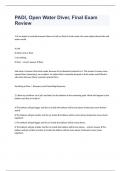
-
PADI, Open Water Diver Review Practice Questions 2024.
- Exam (elaborations) • 27 pages • 2024
-
Available in package deal
-
- $13.49
- + learn more
PADI, Open Water Diver Review Practice Questions 2024.1) If an object is neutrally buoyant (does not sink or float) in fresh water, the same object placed into salt water would A sink. B either sink or float. C do nothing. D float. - correct answer D float. Salt water is heavier than fresh water because it has dissolved minerals in it. This means it causes more upward force (buoyancy) on an object. An object that is neutrally buoyant in fresh water would float in salt water because ther...

That summary you just bought made someone very happy. Also get paid weekly? Sell your study resources on Stuvia! Discover all about earning on Stuvia


